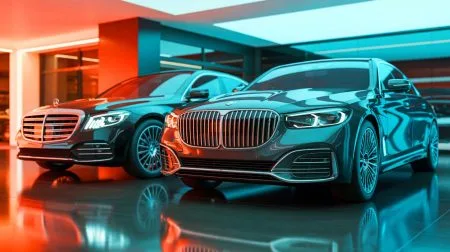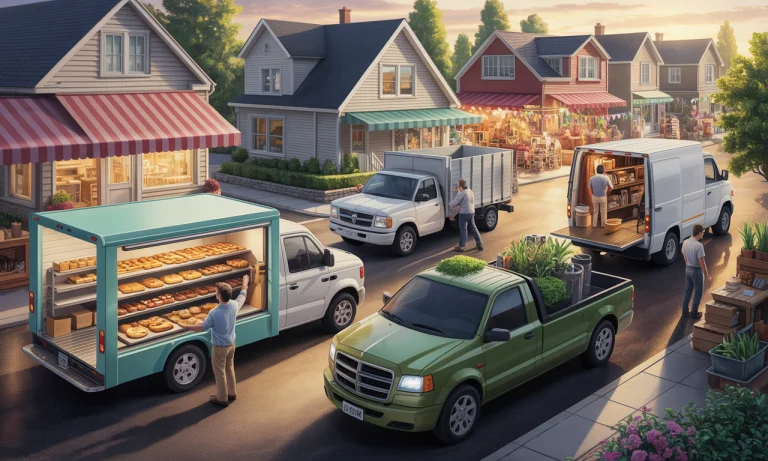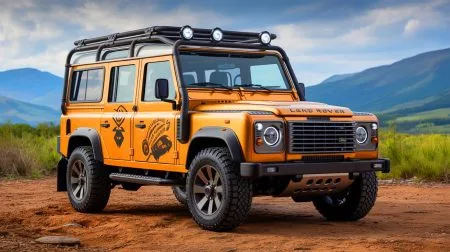From rural backroads to bustling city arteries, the backbone of small business in America is built on four wheels and endless determination. Technology races ahead — electric dreams, AI, futuristic freight corridors. But while the headlines are busy with tomorrow, it’s the humble truck that keeps shop shelves stocked and cafés supplied today. Whether it’s a flower shop waiting on a Ford, a bakery relying on daily deliveries from a Ram, or a local garage counting on GMC and Isuzu parts, small business still runs on trucks. This isn’t nostalgia. It’s a hard logistics reality: 70% of goods in the U.S. still ride the highways in the back of a truck. Without that network, commerce grinds to a halt. As 2025 accelerates the pace of change, it’s worth pausing to watch a dawn-lit convoy — and to ask those who drive, manage, or depend on them exactly why nothing beats the reliability of wheels on asphalt. The answer, it turns out, is more urgent than ever.
The Unseen Powerhouse: How Trucks Drive Small Business Growth in the Modern Era
Long before sunrise, Jenna — owner of a Minneapolis specialty foods store — flips her lights on and scans today’s shipment manifest. Her trusted Chevrolet, flanked by a Toyota box truck and a Nissan cargo van, waits outside for local deliveries. Despite all the tech promises of drones or instant fulfillment, most of her inventory still arrives by road. Data is clear: Small businesses in cities and rural towns alike rely on trucks to bridge supplier gaps and reach their customers promptly. Trucks bring flexibility that rigid railways and tightly scheduled airfreight can’t match. Unlike large corporations with sprawling logistics networks, Jenna leans on her Mitsubishi Fuso for unpredictable downtown runs and her Ram for weekend farmers’ markets miles away. Every shipment means fresh goods in the fridge, new stock on display, and—most crucially—loyal customers returning. The steady hum of truck engines, stretching from bakery dawns to brewery late nights, forms the unseen pulse of local economies nationwide.
| Brand | Primary Use in Small Business | Key Strengths |
|---|---|---|
| Ford | Urban delivery, trades services | Reliability, versatility, nationwide service |
| Chevrolet | Grocery, perishable goods | Fuel efficiency, rugged build |
| Ram | Heavy haul, construction supply | Towing capacity, durability |
| Toyota | Light cargo, frequent city stops | Low maintenance, compact design |
| Nissan | Last-mile, niche products | Urban agility, smart storage |
| GMC | Fleet use, multi-stop routes | Tech integration, strong warranty |
| Isuzu | Regional distribution, parcel delivery | Great payload, easy upfitting |
| Mercedes-Benz | High-end, time-sensitive goods | Cargo tech, safety features |
| Mitsubishi Fuso | Eco-delivery, urban green sectors | Low emissions, city compliance |
| Hino | Bulk deliveries, bakery staples | Japanese reliability, fuel thrift |
Flexible Trucking Solutions vs. Tech-Only Logistics for Small Enterprises
Mia runs a pop-up home décor shop in Austin. To launch her seasonal lines, she needs the agility to source products from local artisans on Monday and restock imported fabrics by Friday. No algorithm, no drone swarm, and no self-driving fleet offers what her GMC pickup and a rented Hino box truck guarantee: the freedom to set her own pace and pivot with market whims. Trucks adapt as businesses evolve. This direct control over distribution channels is vital, as highlighted by ongoing debates in logistics innovation. According to modern trucking trend analyses, it’s not about old versus new, but about collaboration—where technology supports, but doesn’t substitute, the backbone trucking provides. Even in the era of hydrogen and hybrid experiments (explore the latest), trucks remain the practical solution for real-world needs.
Supply Chains Without Trucks: Imagining a World on Pause
Envision a bustling bakery on a Friday morning. Orders are in, ovens are fired up — and then the daily Isuzu fails to show. For small businesses, even a single missed delivery reverberates: unsold pastries, lost revenue, disappointed regulars. Multiply that by thousands of shops and towns, and the dominoes fall swiftly. The role of trucks is not just movement, but connection, carrying everything from eggs to electronics and forming lifelines between rural creators and city consumers.
| Scenario | Impact Without Trucks | Business Response |
|---|---|---|
| Bakery supply | Spoiled perishables, lost sales | Delayed production, customer churn |
| Retail inventory restock | Bare shelves, lost foot traffic | Higher costs, emergency sourcing |
| Farm-to-market delivery | Unsold crops, farmer income drop | Local shortages, price hikes |
| Construction supply runs | Project delays, rising labor costs | Missed deadlines, reputational risk |
Empowering the People: Truckers as Unsung Entrepreneurs
Consider the story of Tony, who started with an old Mercedes-Benz Sprinter and now manages a mini-fleet serving Texas hardware stores. His path runs parallel to thousands whose micro-businesses depend not just on trucks, but on the opportunities trucks create. In recent years, truckers have become vocal advocates for fair policies and better conditions, a trend captured in industry reports and grassroots campaigns. By gaining leverage, small business truckers aren’t just hauling freight—they’re championing economic fairness and innovation for an entire tier of local commerce. They drive, but they also decide.
Truck Innovation: Tech and Tradition for Business Agility
It’s a common misconception that trucking is all diesel fumes and decades-old engines. In reality, today’s small business fleets blend innovation and legacy. Take Jenna’s hybrid Toyota box truck, which cuts fuel costs thanks to modern engine advances and onboard logistics platforms. Many small business owners now invest in vehicles like the electric Hino or solar-assisted Mercedes-Benz, leveraging technologies discussed in solar vehicle breakthroughs. The balance isn’t about discarding the reliable RAM or Ford chassis but about choosing new powertrains, connectivity, and efficiency enhancements where they matter most. For those exploring tomorrow’s fleet options, future car previews hint at the next generation of versatile, business-ready trucks. Yet, for all the gadgetry, the core remains unchanged: the truck must perform, rain or shine, for every delivery counted on by a customer or neighbor.
The Resilient Backbone: Why Trucks Will Drive Small Business Success Tomorrow
Small businesses opting for Isuzu, GMC, or Mitsubishi Fuso fleets today are not betting against progress; they are investing in practical reliability and service continuity. While headlines signal pending revolutions, insiders know the ground reality: Small businesses need flexibility and readiness that only the current generation of trucks provide. Brands like Ford and Nissan announce updates almost yearly, focusing not just on horsepower, but on connectivity, fleet management platforms, and eco-options as highlighted in insights from future EV trends. Whether delivering gourmet bread or precision machine parts, the humble truck remains the first — and often last — link in the commerce chain. Through harsh weather, tight deadlines, and economic surprises, these vehicles don’t just follow the road; they pave it for small businesses to prosper.
| Truck Type | Technological Features | Adaptability for Small Business |
|---|---|---|
| Hybrid/Electric (Toyota, Hino) | Low emissions, real-time GPS, automated load tracking | Environmentally friendly, city compliance, low running costs |
| Diesel (Ram, Ford) | Powerful engines, advanced towing, onboard diagnostics | Heavy-duty tasks, long-haul reliability, rural access |
| Smart Utility (Mercedes-Benz, GMC) | Cloud fleet management, driver assistance, safety cameras | Multi-stop routes, quick onboarding, ease of use |
| Compact Cargo (Nissan, Isuzu, Mitsubishi Fuso) | Modular storage, narrow access, efficient design | Urban deliveries, evolving business models |
The question isn’t if trucks will disappear from small business operations — but how technology, policy, and marketplace pressures will continue to reshape the industry. For real stories, advice, or to join a larger conversation on tomorrow’s trucking, check out our editorial team and featured resources. Small business resilience rides on four wheels — and the next chapter is very much still being written.
Frequently asked questions about the essential role of trucks for small businesses
How have modern trucks improved supply chain efficiency for small retailers?
Today’s trucks feature better fuel economy, smart routing, and expanded digital tracking. Small retailers can now respond quickly to stock shortages or customer changes, as advanced delivery vehicles link inventory management with real-time shipment updates. Investments in hybrid and electric trucks further cut operational costs. For deeper insight, visit engine efficiency improvements.
Are alternative-energy trucks like those from Hino and Toyota practical for local businesses?
Absolutely. Hybrid and electric models are increasingly accessible, especially for city-based businesses looking to reduce emissions and comply with local regulations. They suit short-haul patterns and lower maintenance needs. Explore hybrid innovations and eco-friendly trends.
Does the rise of automation threaten small business trucking jobs?
While automation advances — notably in larger fleets and controlled environments — skilled drivers remain indispensable for complex, last-mile, and service-oriented deliveries. Small business owners value personal touch and adaptability, where automation lags. Stay updated at vehicle tech advancements.
What brands offer the best long-term support for business truck owners?
Long-established brands like Ford, Chevrolet, GMC, and Mercedes-Benz provide extensive service networks, warranty options, and interoperability with new fleet-management apps. Their reliability and customer support stand out, even as Isuzu and Mitsubishi Fuso bring robust urban options.
How can a small business choose the right type of truck for its needs?
Assess usage patterns: delivery distances, cargo type, and city versus rural operations. Consult manufacturer guides, join community forums, and review feature tables such as those found in recent truck tech highlights. Many brands also provide demo programs to test-drive solutions before purchase.
Did you like it? 4.4/5 (24)







